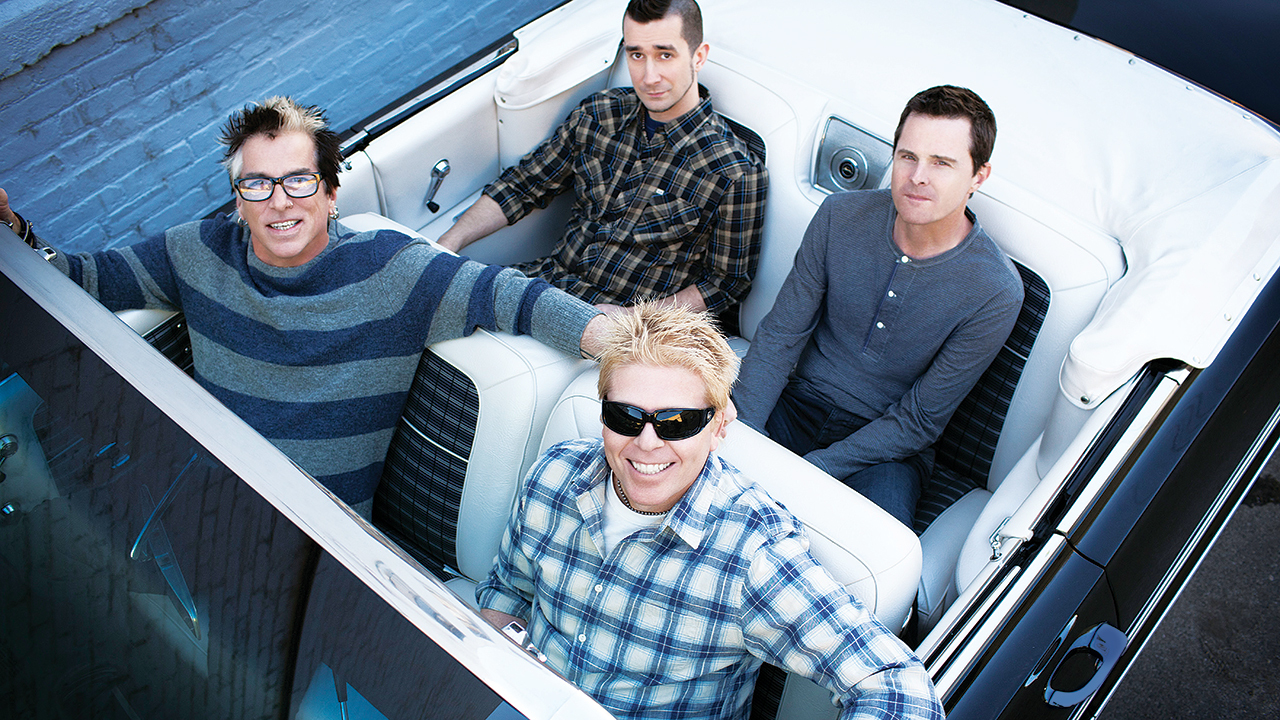The Offspring: Their best albums in their own words
The Offspring Guitarists Dexter Holland and Noodles take us on a trip through the albums that made them one of the biggest and best bands in punk history

Select the newsletters you’d like to receive. Then, add your email to sign up.
You are now subscribed
Your newsletter sign-up was successful
Want to add more newsletters?

Every Friday
Louder
Louder’s weekly newsletter is jam-packed with the team’s personal highlights from the last seven days, including features, breaking news, reviews and tons of juicy exclusives from the world of alternative music.

Every Friday
Classic Rock
The Classic Rock newsletter is an essential read for the discerning rock fan. Every week we bring you the news, reviews and the very best features and interviews from our extensive archive. Written by rock fans for rock fans.

Every Friday
Metal Hammer
For the last four decades Metal Hammer has been the world’s greatest metal magazine. Created by metalheads for metalheads, ‘Hammer takes you behind the scenes, closer to the action, and nearer to the bands that you love the most.

Every Friday
Prog
The Prog newsletter brings you the very best of Prog Magazine and our website, every Friday. We'll deliver you the very latest news from the Prog universe, informative features and archive material from Prog’s impressive vault.
To salute their services to pop punk guitar, it’s time to take a look at The Offspring’s key albums with Dexter Holland and Noodles.
Ignition (1992)
What was it like revisiting those songs after so long?
Noodles: “It was a fucking blast! A lot of the songs came right back; others like Kick Him When He’s Down had never left.”
Dexter Holland: “Some songs I don’t remember playing live before, like No Hero, but I guess we must’ve done. We did a soundcheck and I forgot what a small club smells like at 4pm when nobody’s in there except for the guy at the bar washing glasses.”
Do you think your attitudes to guitar playing have changed much since writing those songs?
Noodles: “I’m not sure about attitudes, but our abilities have slowly improved. Actually, if you look at Dirty Magic, I remember a friend from [fellow OC punks] Guttermouth going, ‘I don’t know about that song dude, it’s not punk’. I was like, ‘Fuck you, it’s a good song!’”
What gear were you playing back then?
The latest news, features and interviews direct to your inbox, from the global home of alternative music.
Noodles: “We got whatever we could from thrift stores. My first amp was a Music Man, then a Rickenbacker Road combo. Eventually I got a crappy Marshall Mosfet. On the record I played a Gibson Sonex… or maybe an Epiphone Les Paul.”
Dexter: “When we started out, none of us knew about instruments. The local store sold me a Hondo guitar, which I’m sure nobody’s heard of, and a Music Man amp. Greg K [bassist] bought a single-speaker Peavey practice amp for bass. Neither sounded good. His was just distortion – it’s a Peavey, right? So we swapped them around, which made it better. I think I played an Aria guitar on this record. It was a very gradual climb finding decent guitar gear for us.”
Dexter: “People have actually commented that it sounds like True Sounds Of Liberty, and they stole from the old British goths, so maybe it was an indirect influence. TSOL were one of our favourite bands growing up, along with Dead Kennedys and the Ramones. They were from Orange County, too.”
Buy: Amazon
Smash (1994)
Did this album mark your maturity as songwriters?
Dexter: “I see Ignition as the record that first sounded like The Offspring, but we were really excited recording this. We’d been touring with NOFX and Pennywise and were in the mix of the scene. The songs just got better, I guess. But they were written quickly.”
How do you feel about Smash influencing a generation of kids to take up guitar playing?
Dexter: “It’s flattering, but it makes me feel uncomfortable because I don’t see us in the same categories that I see our idols. Making you want to start a band is what the Ramones, Sex Pistols and The Clash do. Not us!”
Why do you think kids gravitated towards those riffs?
Noodles: “Because they’re fucking brilliant! [laughs] The timing had a lot to do with it. It was over-produced rock until Nirvana tore down walls and opened radio to new things.”
Dexter: “They’re catchy riffs. We loved bands that were very punk, but these bands didn’t always have great melodies. We added something musically memorable to the energy of punk music.”
It’s the biggest selling independent label album ever. How did you cope?
Noodles: “It was scary. We turned down performing on Saturday Night Live. I wish we hadn’t, but we weren’t ready. For 10 years it had just been a hobby of jumping into a van during summer vacations.”
You mentioned that sometimes you were criticised for not being ‘punk’. Similar things must have been said about Smash…
Noodles: “Yeah, a lot of people didn’t like it, and we got it again with Pretty Fly… [from Americana]. But we’d stopped caring. If it’s a good song, then fuck it! Everyone’s got different ideas about what punk is. If you try to fit everyone’s mould, you’ll fall apart.”
Key song: Come Out And Play
Dexter: “The riff… well we both loved the surf guitar thing, especially Dick Dale, and that harks back to Orange County surfing in the 60s. We also got a kick out of the Middle Eastern melodies, which was similar in a way. We’d messed around with parts like that for years, such as on Blackball [from 1989 debut The Offspring], but this just worked.”
Buy: Amazon
Ixnay On The Hombre (1997)
With the band now signed to Columbia, their major-label debut had the same energy, but lacked the sales of its predecessor.
Dexter: “When any band has a really big record, it’s inevitable that the next one isn’t as successful. We knew people would characterise this as a sophomore slump, so we just did our own thing. It ended up being one of the records that our die-hard fans like the most because it feels darker. Dave Jerden produced it and he’d worked with Alice In Chains, Social Distortion and Jane’s Addiction.”
Did being on a major label affect the recording process?
Noodles: “It gave us more time. We did Smash on no budget at all and were constantly calling our studio to find out when it was empty just so we could sneak in at a discount price. But for Ixnay…, we had a three-week lockdown in Dave’s studio.”
Dexter: “It was nice to have the time to get better sounds. When people say how much they like a band’s earlier records because they sound raw, they mistakenly think that’s what the band were trying for. Really, it’s just the best they could manage at the time.”
Did the larger budget allow you to upgrade to better gear?
Noodles: “Yeah, I started collecting guitars around that time. I got a nice Strat, a nice Les Paul, a couple of weird ones with a different sound.”
Noodles: “I think that it’s one of the best songs we’ve ever written. Lyrically, it’s really meaningful and deals with loss. Structurally, it’s simple. But it’s done well and means a lot.”
Buy: Amazon
- Green Day's 10 most punk moments
- The Offspring celebrate Smash anniversary
- Our TeamRock+ offer just got bigger. And louder.
- How The Offspring Became One Of The Biggest Punk Bands In The World
Americana (1998)
Noodles: “Certainly, with that song, we were stepping outside our comfort zone. It’s worked around the percussion. The guitar is pretty simple. I was playing a little Smokey Amp, which was a plastic speaker literally built inside a cigarette pack with a nine-volt battery. We stuck it inside a bucket. That’s how we got the ‘jang jang’ sound, which was nice and clean.”
Dexter: “On each record we have always tried to step out a little bit, though.”
Noodles: “Led Zeppelin? That’s very flattering! If I remember, that one just started with the main riff, which we just added to.”
Key song: Pretty Fly (For A White Guy)
Dexter: “We just tried to put together a fun song. That started with a simple riff, too, and we built everything around that. The girl vocal kept it fun. I remember thinking that the guitars didn’t sound good, though. They sound different to the rest of the album. It’s very muted. It wasn’t intentional. Maybe we didn’t change our strings that day. Maybe it was to do with the amps we were using. It’s never going to be 100 per cent consistent.”
Buy: Amazon
Days Go By (2012)
The band’s most recent album – which is still five years old already – features experimental pop ditties mixed with thunderous blasts of stadium punk, all given oomph by Bob Rock.
How did your songwriting and guitar interplay evolved on the new record?
Dexter: “We did more different guitar parts to each other. On the title track I’m playing open chords and Noodles is doing a picking line. He doesn’t play a single chord on that song.”
Noodles: “We’re always experimenting. We’ve done the hard, fast, power and barre chord-driven songs, but it can be too much to have them all the time. The ballad All I Have Left Is You has some of the prettiest guitar lines we’ve ever done.”
Dexter: “I like that track. Its main part is played on piano – we couldn’t get it sounding right on guitar.”
Saccharine pop number Cruising California (Bumpin’ In My Truck) is another departure. Users on YouTube are debating whether it’s an ironic dig at Justin Bieber and co…
Dexter: “We had people say that they can’t tell if we were writing a pop song or trying to take the piss out of pop songs. I like that! I don’t want to answer that question!”
Noodles: “We always try tongue-in-cheek stuff – it’s Cruising California and I Wanna Secret Family (With You) on this record. Slim Pickens [Does The Right Thing And Rides The Bomb To Hell] has a funny riff, but it’s also dark and nihilistic.”
OC Guns has a Latino vibe. Do you push yourselves as guitarists each album?
Noodles: “It’s fun to apply what’s good about our band to different musical styles. We’ve been influenced by Mexican culture from growing up in Southern California. But it took a long time trying to blend full-on Mariachi with reggae.”
Dexter: “We’re not the first punk guys to take on reggae – The Clash did, of course – but we try to keep it [true to] ourselves and make it sound Californian.”
The album signs off with songs that are classic Offspring…
Dexter: “Divided By Zero and Slim Pickens… were the last songs recorded. Noodles said to Bob Rock right after we’d done them that the album felt complete. Some things could be considered a departure but those tracks brought it all together.”
Key track: Days Go By
Dexter: “That main riff reminds you of The Cult? Bob did produce The Cult, of course. I’ve heard people say that, but I take it as a compliment. I love that band. I actually came up with that riff at the last minute.”
Buy: Amazon
10 Cali punk albums that paved the way for The Offspring's Smash
Battle Of The Bands: The Offspring vs Bad Religion
Someone's made The Offspring's Pretty Fly (For A White Guy) using 230 film clips
